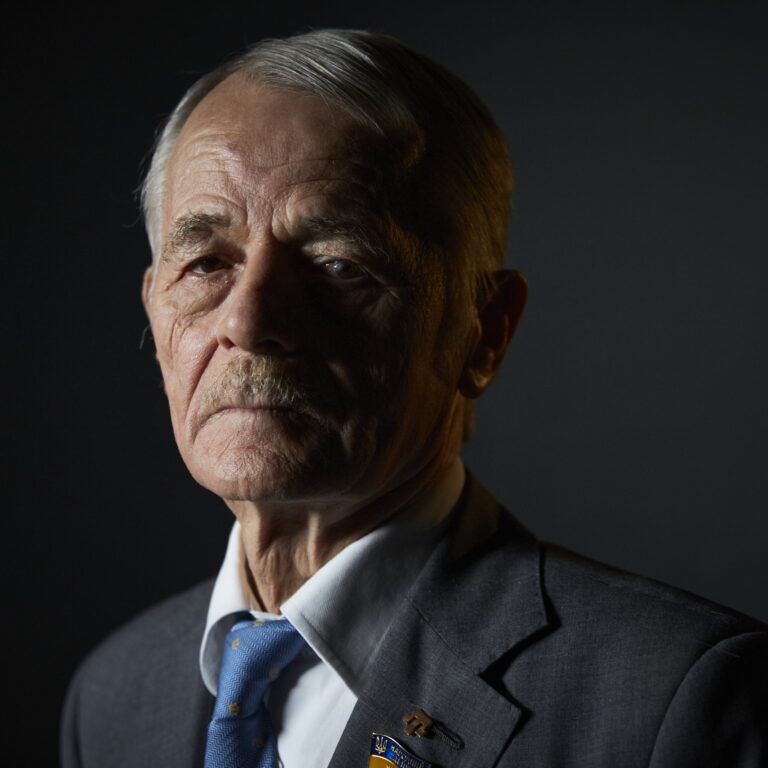
Tej nocy nieznośnie wyły drapieżne zwierzęta – wilki albo szakale. „Zaraz nas zjedzą” – płakał trzyletni chłopczyk, próbując zagłuszyć straszne dźwięki. Mama posadziła go sobie na kolana, przytuliła i uspokajała: „Tato nie pozwoli, żeby nas ktoś zjadł. Nie martw się, Mustafo”.
Chłodnej nocy 1946 r. rodzina Dżemilewów jechała do nowego mieszkania. Za zgodą komendanta.
— To są moje pierwsze wspomnienia z dzieciństwa — 75 lat później opowiada o tych wydarzeniach dysydent i więzień polityczny Mustafa Dżemilew. Siedzi w wygodnym, miękkim fotelu w swoim gabinecie w Kijowie. Pomieszczenie ozdobione jest przedmiotami powiązanymi z Krymem. Na ścianie znajduje się obraz z widokami z Bakczysaraju.
— Miałem siedem miesięcy, kiedy nas deportowali. Moja rodzina trafiła do Uzbekistanu, do obwodu andiżańskiego. Przed naszym przyjazdem przeprowadzono zmasowaną akcję propagandową: wiozą zdrajców. W wielu miejscach miejscowi witali pociąg gradem kamieni. Ale kiedy widzieli, że z pociągów wychodzą kobiety i dzieci, uspokajali się. Dyskryminacja była jawna. Byliśmy pod dozorem komendanta, rodzice co tydzień musieli się zgłaszać. Mieli możliwość przemieszczania się jedynie w promieniu czterech kilometrów. Bez zgody komendanta nie można było nawet pojechać na pogrzeb krewnych do sąsiedniej wioski. Samowolny wyjazd uważało się za ucieczkę i karano 25 latami więzienia.
Deportacja Tatarów krymskich
Dla uzasadnienia ludobójstwa Tatarów krymskich, którego sprawcami w 1944 r. były radzieckie władze, wykorzystano fałszywe oskarżenia o współpracę z nazistami.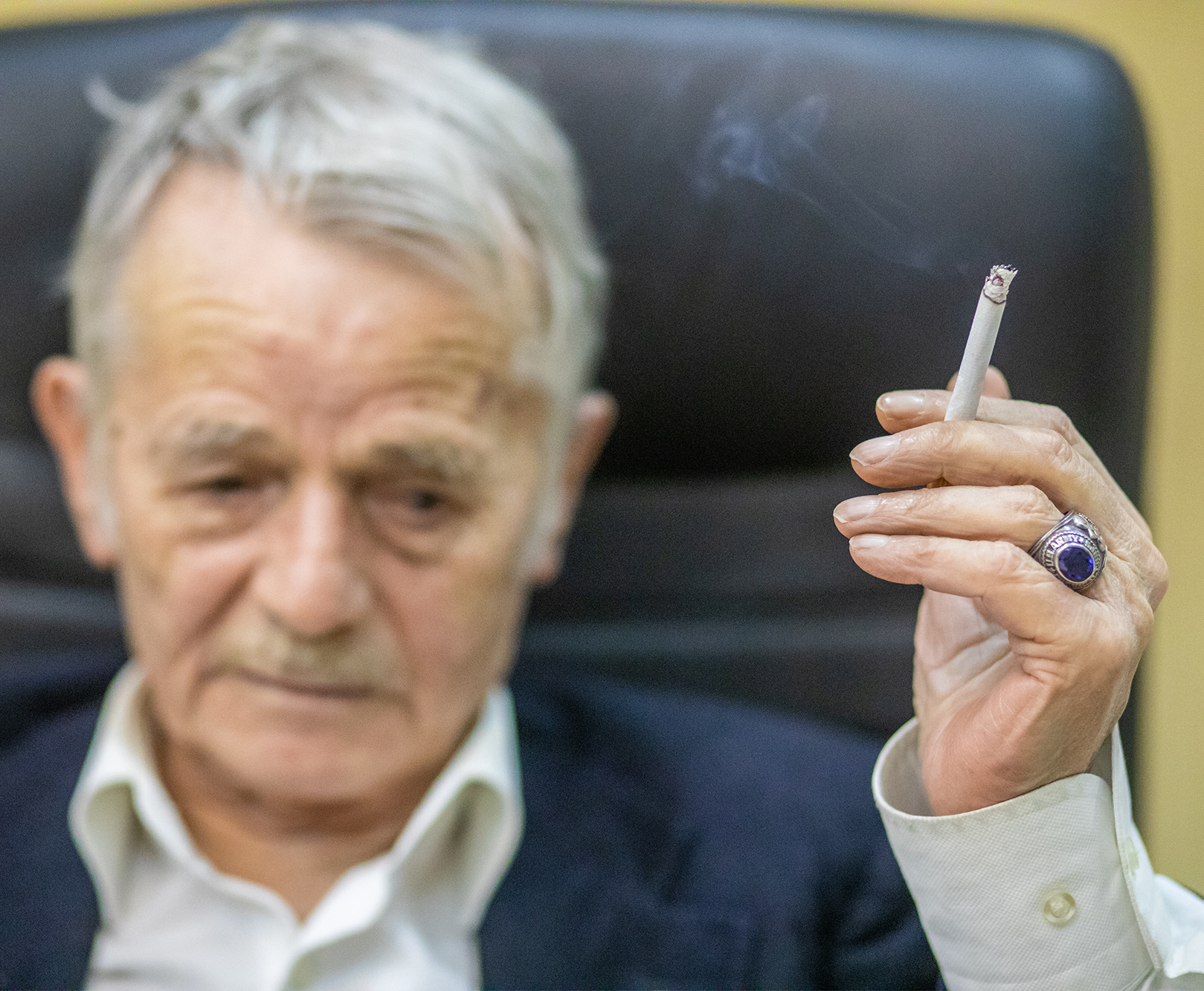
Foto: Ołeksandr Chomenko dla „Lokalna istorija”
Dżemilew zaciąga się papierosem. Sądząc z zawartości popielniczki i zasłony dymu w gabinecie, nie jest to jego pierwszy.
Rozmowę przerywa dzwonek do drzwi. Do Dżemilewa przychodzą mężczyzna i kobieta. Witają się po krymskotatarsku. Kobieta z uwagą przykłada sobie rękę pana Mustafy do czoła i całuje: to tradycja, znak szacunku do ludzi w starszym wieku.
— Jesteście krewnymi? — pytam.
— Niemal — uśmiecha się mężczyzna. — Z Mustafa-agą setki godzin graliśmy razem w szachy.
Aga (albo Ağa)
Zwrot grzecznościowy używany przez Tatarów krymskich w stosunku do mężczyzn.Gość wyjmuje z pudełka fotografię w ramce. Na zdjęciu jest on z Dżemilewem obok szachownicy. Podkłada zdjęcie Mustafie-adze do podpisu. Dżemilew podpisuje po arabsku i po krymskotatarsku. Jednocześnie prosi mężczyznę, żeby włączył wnuczce na tablecie film animowany: „Po krymskotatarsku, ukraińsku, turecku czy angielsku. W żadnym razie po rosyjsku. Bo ona już zaczęła do mnie mówić po rosyjsku”.
Najmłodsza w rodzinie Dżemilewów ma trzy lata. Mustafa-aga pokazuje najnowsze fotografie Merjem na ekranie telefonu – dziewczynka trzyma w rękach flagę ukraińską i krymskotatarską. „Jeszcze taką trzeba wydrukować i gdzieś tu powiesić”, — ogląda ściany, wybierając miejsce. Tymczasem kobieta, która odwiedziła Dżemilewa, przynosi wszystkim kawę i stawia na stół słodycze.
— Największą przyjemnością dla Tatarów krymskich w czasach deportacji było odwiedzanie siebie nawzajem — opowiada Mustafa-aga. — Grafik był skomplikowany: oni przyszli do nas, później my — do nich. Dla gości nawet w najbiedniejszych rodzinach chowano coś na poczęstunek. Na przykład kawę. Starano się nie prowadzić otwartych rozmów przy dzieciach. Pamiętam, kiedy tato coś takiego zaczynał, mama go szturchała: „Cii, dzieci”.
Drzwi u Dżemilewa prawie się nie zamykają. Goście są cały czas. Jedni wychodzą, inni przychodzą. Przyłączają się do nas i słuchają, co opowiada Mustafa-aga.
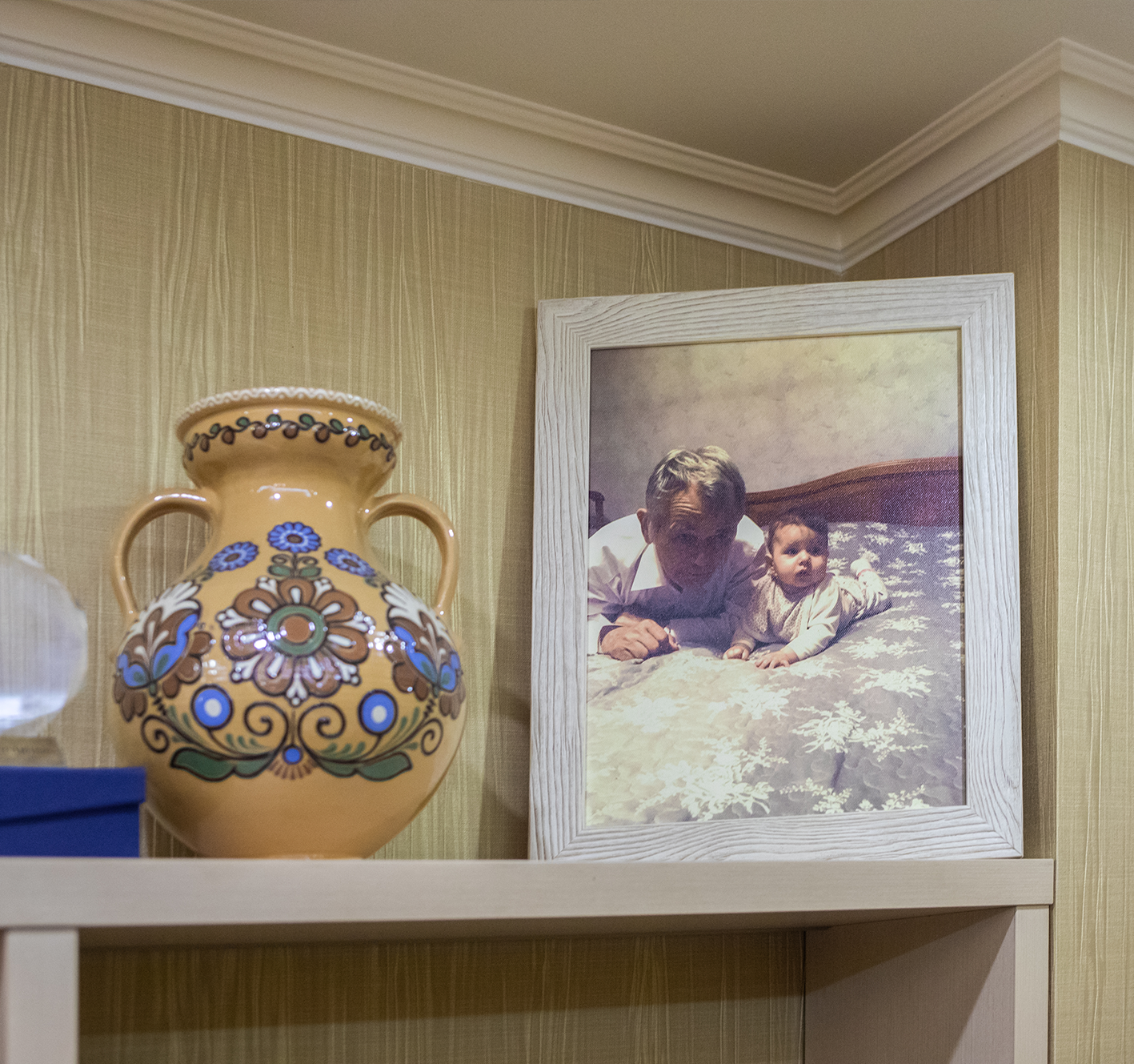
Foto: Ołeksandr Chomenko dla „Lokalna istorija”
„Pies zdechł”
— Był marzec 1953 roku. Radio było u nas włączone. Głos Lewitana ogłosił – zmarł Stalin. A tato mówi – nareszcie pies zdechł. I z takim nastrojem poszedłem do szkoły. A tam wszyscy płaczą. Lamentują. Jakby koniec świata nastał. I tylko Tatarzy krymscy nie płaczą. Reszat Bekmambetow był naszym liderem, zebrał wszystkich i mówi: „Słuchajcie, wszyscy płaczą, oprócz naszych. Trzeba trochę popłakać. Bo jak nie, to aresztują naszych rodziców.” Przyniósł nam cebulę.
Jurij Lewitan
Spiker radiowy w Związku Radzieckim.A potem zaprowadzili nas na apel. Dyrektor szkoły przemawiał, nie dokończył, rozpłakał się. A ja myślę: tato powiedział, że nareszcie pies zdechł, a ten płacze, jakby jego rodzony ojciec umarł. Byłem ciekaw, jak będzie się zachowywał. Śledziłem go. Wszedł do pustej klasy, bił głową o ściany i ryczał. Psychoza taka była.
Potem powiedziano, że w związku ze śmiercią wodza ogłoszono trzy dni żałoby, nie będzie lekcji. O mało nie krzyknąłem „hurra!”. Gdybym krzyknął, moich rodziców by na pewno posadzili. Powstrzymałem się i pomyślałem – choć jedną dobrą rzecz zrobił ten Stalin.
Po zakończeniu szkoły Mustafa Dżemilew pojechał do Taszkientu i rozpoczął studia na kierunku język i literatura arabska. Jednak kierownik komisji wstępnej po cichu poradził: nie warto nawet się starać, oni mają instrukcję: Tatarów krymskich – nie przyjmować. Później Dżemilew zrozumiał dlaczego. Wszyscy absolwenci arabistyki trafiali do pracy za granicą i automatycznie stawali się agentami KGB. A krymscy Tatarzy nie bardzo nadawali się na agentów.
Nie dostawszy się do szkoły wyższej, Dżemilew zaczął pracować w taszkienckich zakładach lotniczych. A cały wolny czas spędzał w bibliotece. Chłonął całą literaturę na temat Krymu. Badał, tworzył konspekty. Ćwiczył pismo arabskie.
„Jakie z Rosji gówno”
— Siedzę kiedyś w wydziale wydań rzadkich. Wchodzi dwoje młodych ludzi i rozmawia ze sobą po krymskotatarsku. Jeden podchodzi do mnie i mówi: „Widzę, że pan czyta po arabsku. Może pan coś nam przetłumaczyć?”. Przetłumaczyłem. A on dalej pyta: „Po co panu te wszystkie książki o Krymie?”. Pyta po rosyjsku. Odpowiadam, że jestem Tatarem Krymskim. Bardzo się ucieszyli. Powiedzieli, że zbierają młodzież i tworzą organizację, która ma na celu powrót Tatarów krymskich do Ojczyzny.
Dżemilewa poprosili o poprowadzenie wykładu o historii Krymu na zebraniu organizacji. Spotkali się w prywatnym budynku w pobliżu Taszkientu. Omawiali statut, tekst przysięgi i swoje obowiązki. Sprzeczali się i kłócili. Później, kiedy z wykładem wystąpił nikomu nieznany młodzieniec, sala wybuchnęła oklaskami.
— Nigdy w życiu mnie tak nie oklaskiwali. Bo opisywałem to, co mogło się spodobać moim słuchaczom. Na przykład to, jak w 1711 r. Tatarzy krymscy rozgromili rosyjskie wojsko koło rzeki Prut. Coś w stylu: jacy my odważni, a Rosjanie – gówno. Wykład był napisany odręcznie. I poszedł w świat, był przepisywany.
Już po kilku tygodniach zaczęły się areszty. Zatrzymali właściciela budynku, w którym zbierała się młodzież oraz liderów jeszcze nie utworzonej organizacji.
— Od tego czasu już wszyscy byliśmy na radarze KGB. Dwóch wyrzucono z instytutu. Mnie zwolniono z zakładu. Bezustanna obserwacja. Rozumiałem, że wcześniej czy później mnie aresztują. Zacząłem się uczyć kodeksu karnego, paragrafów, komentarzy, orzeczeń sądowych, czytałem o procesach norymberskich.
Moim zadaniem było odczuć w sądzie moralną satysfakcję. Później, w trakcie wszystkich procesów broniłem się sam i sędziowie dziwili się, że mam taką wiedzę bez prawniczego wykształcenia. Szukałem kontaktu z tymi, którzy skończyli odsiadkę, żeby wiedzieć, jakie tam panują porządki. I nauczyłem się głównej zasady, którą potem sformułował Sołżenicyn: „Niczego się nie bój, o nic nie proś”.
Młoda kobieta, gość Mustafy-agi, w tym momencie wstaje z krzesła i zaczyna poprawiać mu fryzurę.
— Co ty robisz? — Dżemilew jest zaskoczony i zdezorientowany.
— I brwi, brwi mu popraw — podpowiada mężczyzna, rywal Dżemilewa w szachach. Również wstaje z fotela, żeby pomóc kobiecie.
— No, aleście sobie czas na to znaleźli. Czego chcecie? Na mnie i tak już kobiety nie zwracają uwagi, – żartuje Mustafa-aga.
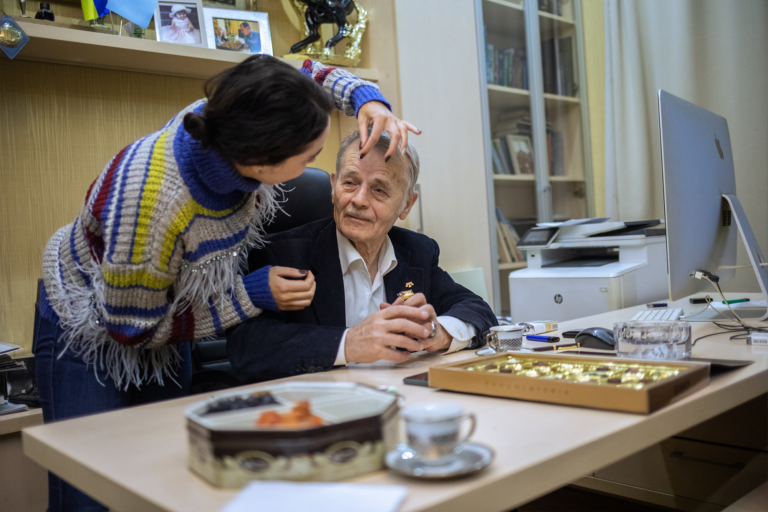
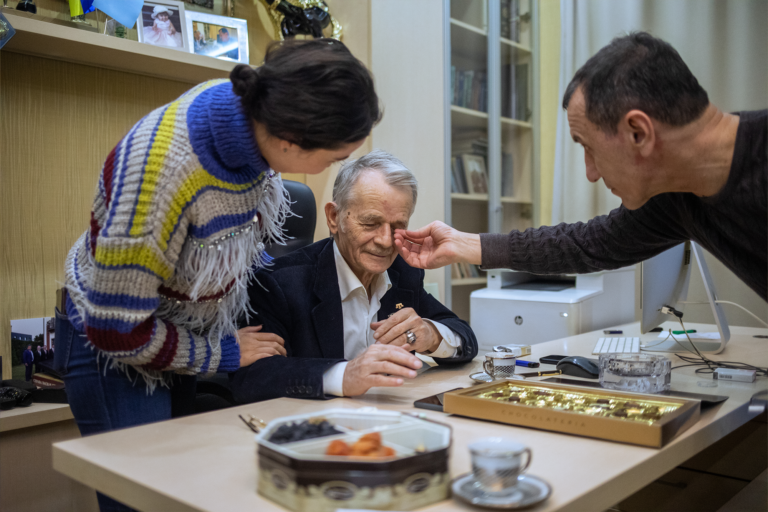
pokaz slajdów
Te spontaniczne i w jakimś sensie zabawne momenty, wyrażają w pełni miłość i szacunek. Mustafa Dżemilew jest dla Tatarów krymskim narodowym przywódcą, drugim ojcem. I ten szacunek jest wzajemny.
Kiedy goście Dżemilewa zdecydowali, że jego wygląd został już wystarczająco poprawiony, kontynuujemy rozmowę.
Hydrauliczne próby z KGB
Mustafa-aga opowiada, jak po szkole wstąpił do wyższej szkoły rolniczej w Taszkiencie na techniczną, zupełnie dla niego nieciekawą, specjalność. Równolegle z nauką zajmował się krymsko-tatarskimi sprawami. Brał udział w protestach, spotykał z ludźmi o podobnych poglądach. Swój barwny wykład rozwinął w „Krótkim historycznym rysie tureckiej kultury na Krymie w XIII-XVIII w.”. W KGB pracę tę nazwano „dziełem z antyradzieckim odchyleniem”, pisanym z pozycji nacjonalistycznej. Na trzecim roku zdecydowano o wyrzuceniu Dżemilewa z uczelni.
— Po naradzie podszedł do mnie kierownik kadry hydrauliki Seliametow Memet Seliametowycz. Dla niego byłem zupełnym zerem, bo z trudem rozumiałem jego przedmiot, hydraulikę. A on wyciągnął do mnie rękę i powiedział: „Nie myślcie, że ja z tego towarzystwa, nie wiedziałem, nad czym będą radzić. Nie jestem Tatarem krymskim, jestem Karaimem, ale do głębi jestem zaniepokojony tym, że oni usprawiedliwiają wysiedlenie całego narodu. Jak mogę wam pomóc?”. A ja miałem egzamin z jego przedmiotu. Wyciągnąłem indeks, a on po prostu tam, na kolanie postawił mi „dobry”. Nigdy w życiu nie miałem oceny „dobrej” z hydrauliki. To było wielkie wsparcie moralne.
Karaimi
Razem z Tatarami krymskimi i Krymczakami należą do rdzennych narodów Ukrainy. Większość przedstawicieli tego narodu nadal mieszka na okupowanym Krymie.Później poszedłem do gabinetu rektora i zastałem tam pracownika KGB, który zajmował się sprawami Tatarów krymskich. Powiedział: „Zgodzimy się na kontynuację nauki, jeżeli napiszecie samokrytyczną notatkę, obiecacie zostać normalnym radzieckim człowiekiem i pomagać organom w walce z odstępcami”. Werbował mnie do grona donosicieli. Od razu powiedziałem rektorowi, że zabieram dokumenty. A kagiebiście pogratulowałem kolejnego zwycięstwa nad kontrrewolucją. Na odchodne nazwał mnie gnidą, gadem, czy jakoś tak.
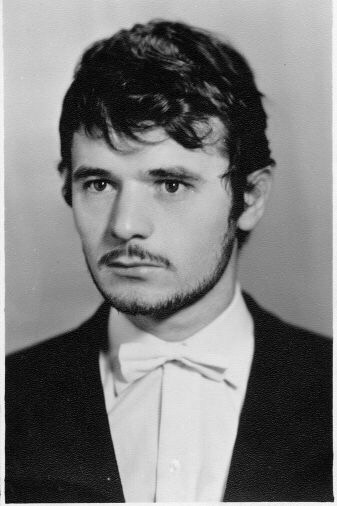
Źródło: „Lokalna istorija”
Areszt nr 1
Następnego dnia na Dżemilewa czekało wezwanie do wojska. Odmówił służby wojskowej. Wyjaśnił: „Odmawiam służenia w radzieckiej armii, bo nie mam ojczyzny, której trzeba bronić. I nie uważam, że za granicami Związku Radzieckiego mam wrogów”. W ten sposób dorobił się pierwszej kryminalnej sprawy i aresztu.
— Dali półtora roku. Siedziałem w obozie „Kuliuk” dla kryminalistów w okolicach Taszkientu. Zabrali mi sznurówki, żebym się nie powiesił. Miałem wtedy taką muszkę zamiast krawatu, były wtedy modne, ją też zabrali. Chodzę po celi tam i z powrotem, martwię się. I jeden blatny (doświadczony więzień — przyp. tłum.) mówi mi: „Coś się tak rozbiegał, siądź, przeszkadzasz”. A ja wiem, że jeżeli siądę, to będzie znaczyło, że się przestraszyłem. A wtedy to już nie jest życie. Skąd się u mnie zjawiła odwaga?!. Pokazałem dwa palce, jakbym chciał oczy wydłubać, podszedłem: „Co powiedziałeś, baranie? W domu będziesz odpoczywał. Tu nie hotel!”. On patrzy się na mnie, mikrusa, a ja myślę sobie: jeśli wstanie, rozmaże mnie na ścianie. Ale on tylko: „Czemu się wkurzasz? Po prostu powiedziałem, że przeszkadzasz”. A ja dalej: „W domu będziesz odpoczywać!”. W więzieniu jest zasada: nie można okazywać słabości.
Miesiąc przed wyjściem na wolność, Dżemilewa i jeszcze jednego Tatara krymskiego przenieśli do izolatki. Wymagali od nich pisemnego zrzeczenia się antyradzieckiej działalności. Mustafa-aga rozpoczął głodówkę. Dziesiątej doby wypuścili go z izolatki bez podpisywania czegokolwiek. Z więzienia zwolniono go z charakterystyką: wykazuje negatywną postawę, utrzymuje kontakty z kryminalnymi autorytetami, biegle włada językiem angielskim i arabskim, i wymaga stałego dozoru.
Gdy tylko pojawiła się taka możliwość, Mustafa wyrwał się do Moskwy. Zaprzyjaźnił się ze znanymi radzieckimi dysydentami: Petrem Hryhorenkom, Petrem Jakirem, Pawłem Łytwynowym, Wiktorem Krasinym. W mieszkaniu generała Hryhorenka, który stał się adwokatem sprawy Tatarów krymskich, i które pełniło funkcję sztabu antyradzieckich sił, mieszkał pół roku. Żonę pana Petra nazywał „moja rosyjska mama”.
Petro Hryhorenko
Ukraiński obrońca praw człowieka, radziecki dysydent. Jeden z założycieli Moskiewskiej i Ukraińskiej Grupy Helsińskiej. Bronił Tatarów krymskich i praw innych deportowanych narodów.Między zwolnieniem i aresztem minęło tylko pół roku. Za Dżemilewem stale chodzili szpicle. Niekiedy udało mu się wyśliznąć.
— W 1968 r. po okupacji Czechosłowacji, zaczęły się masowe protesty jej przeciwników. Mieszkałem wtedy u siostry. Wieczorem zebrałem wszystkie dokumenty, żeby je rano zniszczyć. I zobaczyłem przez okno śledczego. Z materiałami, w podkoszulku, spodniach i skarpetkach wyskoczyłem przez okno. W ogrodzie schowałem się w kukurydzy. Wróciłem w nocy. Siostra płacze, bo zabrali jej męża. A mi zostawili wezwanie na przesłuchanie. Zięciowi dali trzy lata. Siostra potem z niego żartowała: „Tak w ogóle to oni przyszli po Mustafę, ale Mustafy nie było, więc żeby nie wracać z pustymi rękami, wzięli ciebie”.
Areszt nr 2
Mustafa Dżemilew przez pewien czas był na wolności. We wrześniu 1969 r. został jednak aresztowany. Za rozpowszechnianie, oczywiście nieprawdziwych wymysłów, które „oczerniają radzieckie państwo i ład społeczny”.
Dżemilew opowiada: w tej samej sprawie uwięzili też rosyjskiego dysydenta, poetę Ilię Gabaja. Razem trzymali ich w izolatce Lefortowa.
— Już po wyjściu z więzienia pojechałem do zięcia. Kopaliśmy na ogrodzie, słuchaliśmy „Głosu Ameryki”. Był u nas odbiornik „Spinola”. Usłyszałem informację: „Dzisiaj z okna swojego mieszkania na 11 piętrze wyskoczył znany dysydent Ilia Gabaj”. Nie uwierzyłem. Tydzień wcześniej rozmawialiśmy przez telefon. Poszedłem na pocztę, zadzwoniłem do jego żony. A ona potwierdziła, że zrobił to sam, zostawił list. Miał stan depresyjny, bo też Petro Jakir i Krasin zeznawali przeciwko niemu. I ciężko przeżył więzienie. Inteligent, a tu kryminalna hołota, przekleństwa, okrucieństwo. Nie wytrzymał.
Ilja Gabaj
Radziecki pisarz, wykładowca i dysydent żydowskiego pochodzenia. Urodził się w Baku, w Azerbejdżanie. Walczył o prawa obywatelskie, brał udział w walce o krymskotatarską autonomię. Prześladowany przez radzieckie władze, kilka razy był więziony. Popełnił samobójstwo 20 października 1973 roku.Areszt nr 3, sprawa nr 4
Po dwóch latach Mustafę Dżemilewa sprowokowali do konfliktu i posadzili na 15 dni za „chuligaństwo”. Krymskotatarski dysydent zaczął głodówkę, rozwinął się u niego wrzód żołądka i Mustafa-aga odmówił wyjazdu na półroczne ćwiczenia wojskowe. Za to został skazany na rok więzienia.
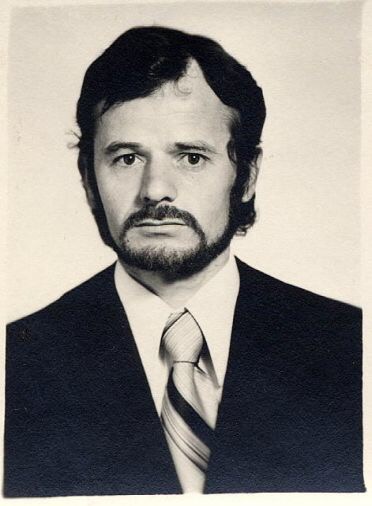
Źródło: „Lokalna istorija”
W omskiej kolonii karnej, przed samym zwolnieniem, do Dżemilewa dotarło, że go nie wypuszczą, przygotowują przeciwko niemu nową sprawę. Śledczy przesłuchiwali współwięźniów i ostatecznie znaleźli takiego, który świadczył przeciwko niemu, skonfiskowali ›napisane prace.
— Zabrali „Deklarację zasad ruchu narodowego Tatarów krymskich”. Napisałem ją arabskim pismem. Język – mieszanka angielskiego, krymskotatarskiego, rosyjskiego z jak największą liczbą skrótów. Rozszyfrowali ją. Zaprosili kierownika katedry języka i literatury angielskiej z Omskiego Uniwersytetu, część po arabsku tłumaczyła wykładowczyni z Taszkientu. Tekst odtworzyli w 90%. Rozumiałem, że dodadzą mi paragraf i nie wypuszczą z więzienia. Wtedy ogłosiłem głodówkę. Napisałem list do akademika Andrieja Sacharowa, który udało się mu przekazać. I Sacharow rozpoczął kampanię z powodu mojej głodówki.
Andriej Sacharow
Radziecki fizyk, laureat Pokojowej Nagrody Nobla (1975) za walkę o prawa człowieka na całym świecie. Od 1980 do 1986 był więziony razem ze swoją żoną Jeleną Bonner.W latach 1975-1976 o sprawie Mustafy Dżemilewa szeroko informowała zachodnia prasa. Dzięki jego długotrwałej głodówce świat dowiedział się także o narodzie wygnanym z ojczystej ziemi.
W siódmym miesiącu głodówki brytyjska gazeta „The Times” poinformowała, że Dżemilew prawdopodobnie zmarł w omskim więzieniu.
— Stało się to tak: moja mama przyjechała do Omska, żeby się ze mną zobaczyć. A naczelnik obozu powiedział jej: waszego syna tu nie ma, idźcie stąd. Ona ze łzami w oczach pojechała do Moskwy, do Sacharowa. Sacharow z Hryhorenkom zorganizowali konferencję prasową i ogłosili: nie można wykluczyć tego, że Dżemilew zmarł. Informacja poszła w świat. W Turcji wspominano mnie w meczetach, układano wiersze, niszczono radzieckie konsulaty.
Po wielu latach Dżemilew opowiada tą historię z uśmiechem na twarzy. Jakby w tych 303 dniach głodu nie było czegoś nadzwyczajnego. Jego głos nie zadrży nawet wtedy, kiedy opowiada o procedurze przymusowego karmienia.
— Jeśli z ust wydobywa się trupi zapach, to oznaka skutków śmiertelnych. Nadzorcy trzymają cię za ręce, rozpierakiem otwierają szczęki – przy tym, zazwyczaj, łamią zęby – i wciskają wąż, przez który wlewają odżywczą ciecz. Ta ciecz podtrzymuje funkcje życiowe. Szybko się wchłania, ale już po godzinie znowu czujesz głód.
W 7-8 miesiącu głodówki przyszedł do mnie lekarz i psychiatra. Lekarz obejrzał mnie, zmierzył ciśnienie. Psychiatra zaczął zadawać pytania. Powiedziałem psychiatrze: „Po co pan przyszedł? Przecież nie ogłosiłem siebie Napoleonem, ludzi wokół nie gryzę.” Odpowiedział, że u człowieka po długotrwałej głodówce mogą pojawić się zaburzenia psychiczne, jego zadaniem jest zbadać mój stan. Kiedy zostaliśmy sami, powiedział: „Tak w ogóle to miałem pana namówić do zaprzestania głodówki, ale moja rada jest taka – niech pan dotrwa do końca. To dla nich wielki cios. O panu bardzo dużo teraz piszą. Niech się pan trzyma”. I poszedł.
Na posiedzenie sądu, które odbyło się 14 kwietnia 1976 r. w Omsku, Dżemilewa przynieśli na noszach. Nie mógł poruszać się samodzielnie.
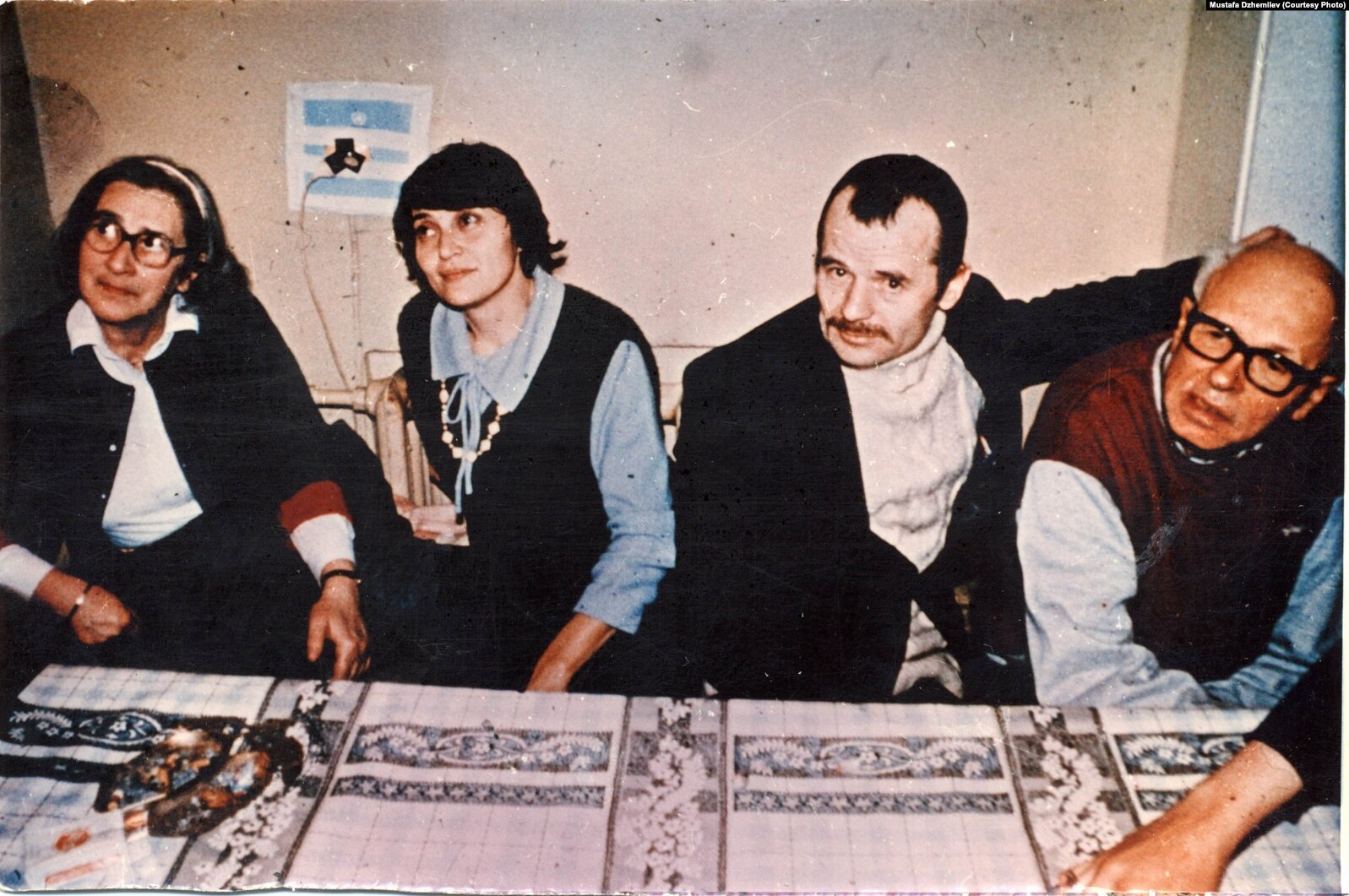
Od lewej: Jelena Bonner, Safinar Dżemilewa, Mustafa Dżemilew, Andriej Sacharow. Archiwum Mustafy Dżemilewa.
Do sądu przyjechał sam Andriej Sacharow. Laureata Nagrody Nobla nie wpuścili do sali. Podczas sprzeczki milicjant popchnął Sacharowa, za co został spoliczkowany przez jego żonę, Jelenę Bonner. Małżeństwo wsadzili do samochodu i wywieźli za miasto. Tymczasem sąd ogłosił wyrok dla Dżemilewa – dwa i pół roku kolonii karnej o zaostrzonym rygorze.
— Po posiedzeniu sądu przez szybę miałem widzenie z mamą i bratem. Mama rozpłakała się, zrobiło jej się niedobrze. A brat powiedział: „Wiem, że nie ma sensu cię przekonywać”. Ale przyłożył do szyby wiadomość od Sacharowa. Bardzo wzruszająco napisał: „Synku, zrobiłem wszystko, co w mojej mocy dla twojego uwolnienia i żeby twoja sprawa była znana na całym świecie. Twoja śmierć tylko ucieszy naszych wrogów. Dlatego proszę cię teraz, żebyś skończył głodówkę”.
W trakcie rozmowy Dżemilew bez przerwy sypie żartami. Ale przy tym wspomnieniu w jego oczach pojawiają się łzy. Słowa Sacharowa zmusiły go do przerwania głodówki – pismo w tej sprawie napisał od razu w pokoju odwiedzin.
Po tym wydarzeniu Mustafę zawieźli do szpitala. Po dwóch miesiącach jechał już na Daleki Wschód, do obozu o zaostrzonym rygorze „Prymorskyj”.
— Przyjechaliśmy transportem około 30 więźniów. Procedura była taka – siedzisz w oddziale specjalnym, dopóki nie wpuszczą cię na teren. Każdego wzywają na rozmowę i wyznaczają brygadę, do której cię skierują. Wszystkich przenieśli, a mnie nie. Mówią, że ze mną osobiście chce porozmawiać naczelnik obozu, przyjedzie za dwa dni. Mijają dwa dni, wzywają. Wchodzę, podaję nazwisko, imię, paragraf, wyrok. A on patrzy się na mnie: „Wy Dżemilew? Mustafa?!”. Mówię: „Tak”. Zaczyna rechotać. Myślę: o co chodzi? A on tłumaczy: „Nie obrażajcie się, tak dużo mi o was opowiadali, myślałem wejdzie jakiś dryblas, który będzie ustawiał wszystkich w więzieniu, a wy tacy”.
Po wyniszczającej głodówce Dżemilew nie nadawał się do fizycznej pracy, dlatego skierowali go do pracy laboranta. Szybko znalazł wielu znajomych, bo umiał z każdym znaleźć wspólny język.
— Jeżeli administracja specjalnie nie prowokowała, to można było żyć z kryminalnymi. Polityczni ich interesowali, bo umieli czytać i pisać. Nazywali mnie „politykiem”. Przychodzili prosić o konsultację. A w omskim obozie miałem ksywkę „prokurator”. Przynosili swoje sprawy, czytałem, a jeżeli nie znajdowałem punktów zaczepienia, mówiłem: „siedź, posadzili cię prawidłowo”; jeżeli znajdowałem, pomagałem pisać wnioski, skargi, żeby sprawy zrewidowali.
Po powrocie z obozu, Dżemilewa trzymano pod dozorem i śledzono każdy jego krok. Mimo tego nie „poprawił się” tak, jak wymagał tego radziecki system sprawiedliwości. Zadawał się z nieprawomyślnymi, podpisywał listy poparcia dla dysydentów. Mustafa-aga zwrócił się do kierownictwa Rady Naczelnej ZSRR z prośbą o to, by pozbawiono go obywatelstwa i pozwolono opuścić Związek. Dodał, że jest gotowy rozmyślić się, jeżeli Tatarom krymskim pozwolą wrócić do domu.
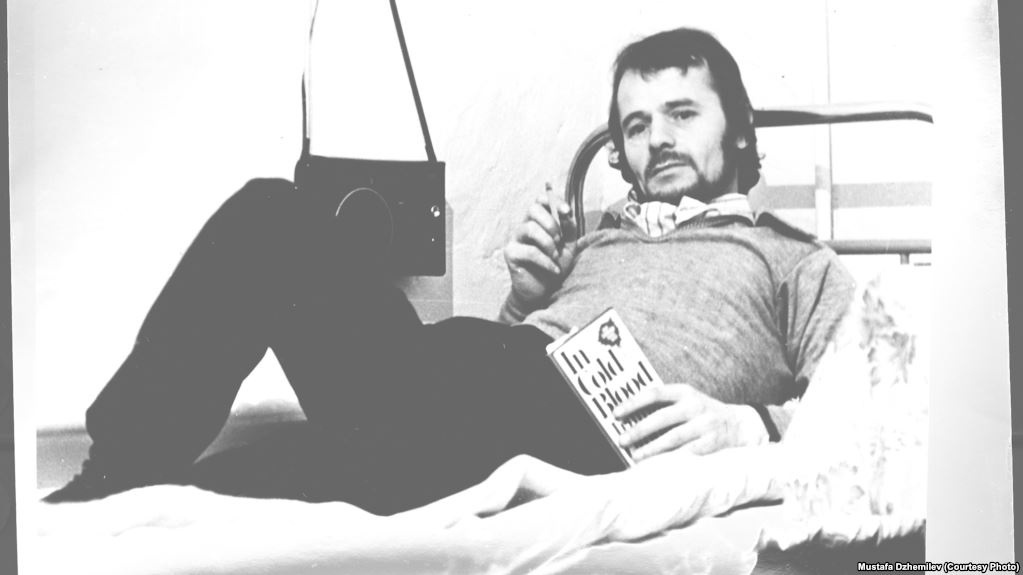
Mustafa Dżemilew. 1979 r. Z osobistego archiwum.
Areszt nr 5 i wesele
W 1979 r. Dżemilewa skazano na półtora roku więzienia. Karę zmieniono na czteroletnie zesłanie do Jakucji.
— Nasi przyjaciele przysłali jednego młodego osiłka, żeby żył blisko mnie i mnie ochraniał. Opowiedział mi o patriotycznej kobiecie, ślicznotce. Jej mąż zmarł na raka i została sama z synem. Była taką patriotką, że chciała sprzedać dom, przeprowadzić się do rodziców, a pieniądze przekazać na krymskotatarski ruch narodowy. Zrobiło to na mnie wrażenie. Poprosiłem o jej adres i zaczęliśmy korespondować.
Potem było wiele żartów na temat tego, dlaczego wyszła za mnie za mąż. Mówiłem: usłyszała w radiu, że 303 dni nie jadłem i pomyślała, że tego mężczyzny nie trzeba karmić.
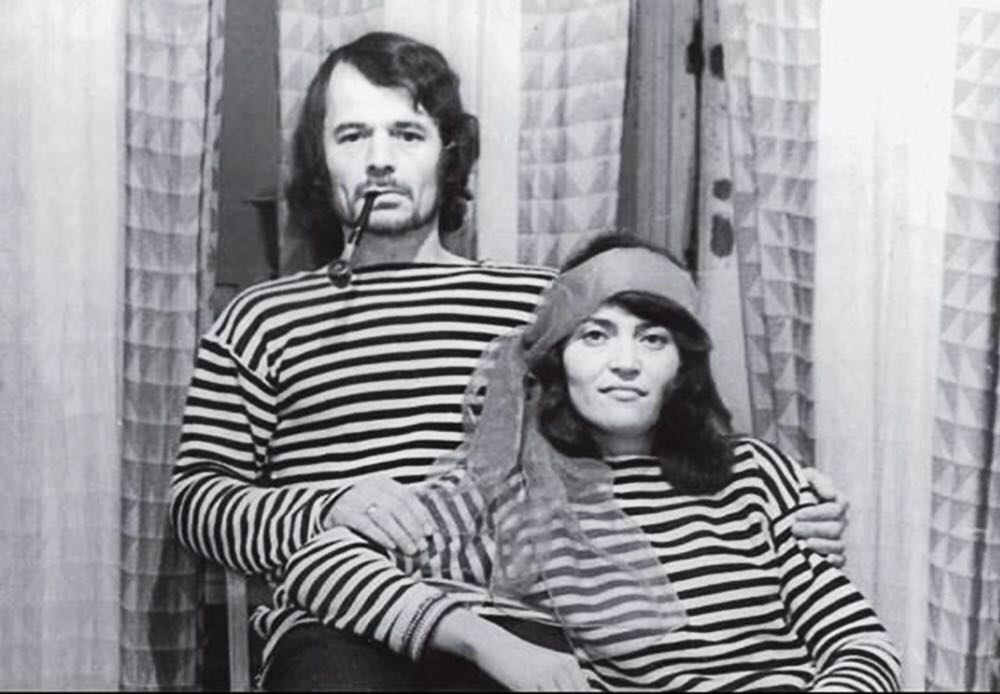
Mustafa Dżemilew z żoną.
Mustafa Dżemilew zanosi się śmiechem i znowu zapala papierosa – jedenastego w trakcie rozmowy. Z tą samą żartobliwą nutą zaczyna opowiadać historię swojej miłości – jak zakochał się w listach i pięknej dziewczynie ze zdjęcia.
— Przyjechała latem. Poszliśmy wziąć ślub w Urzędzie Stanu Cywilnego. Ona podpisała dokument. Ja czekam. Pracownica USC mówi: „Dlaczego nie podpisujecie?” Popatrzyłem na Safinar i zapytałem: „Nie będziesz mnie obrażać?”. Odpowiedziała: „Nie, nie”. I dopiero wtedy podpisałem. Tam na zesłaniu zmajstrowaliśmy dziecko i stamtąd wróciliśmy już z synem Chejsarem.
Trzy dni na Krymie. I areszt nr 6
Czas zesłania skończył się w lutym 1983 r. i Dżemilew z Jakucji wyruszył prosto na Krym. Tam, gdzie się narodził, do miejsca, którego ani trochę nie pamiętał i które przez 39 lat życia uważał za ziemię obiecaną.
Na półwyspie rodzina Dżemilewów zatrzymała się tylko na trzy doby. Wsadzono ich w więzienny samochód i wywieziono z Krymu. Wtedy rodzina wróciła do Uzbekistanu, do miasta Yangiyoʻl. Tam Mustafa Dżemilew zaczął pracować jako redaktor nielegalnego informacyjnego biuletynu inicjatywnej grupy Tatarów krymskich im. Musy Mamuta i wkrótce znów stał się ofiarą represji.
Dżemilewa aresztowano w listopadzie 1983 r., pół roku po powrocie z zesłania. Oskarżono go o przygotowanie i rozpowszechnianie dokumentów, które oczerniają radziecki porządek i polityczny system, za nagrywanie audycji radiowych wrogich krajów i organizację masowych niepokojów. Skazano go na trzy lata.
Dla odbycia kary został wysłany do kolonii karnej o surowym rygorze w obwodzie magadańskim. Znowu do kryminalistów. Mustafa Dżemilew podsumowuje: ani razu nie siedziałem w obozie dla więźniów politycznych.
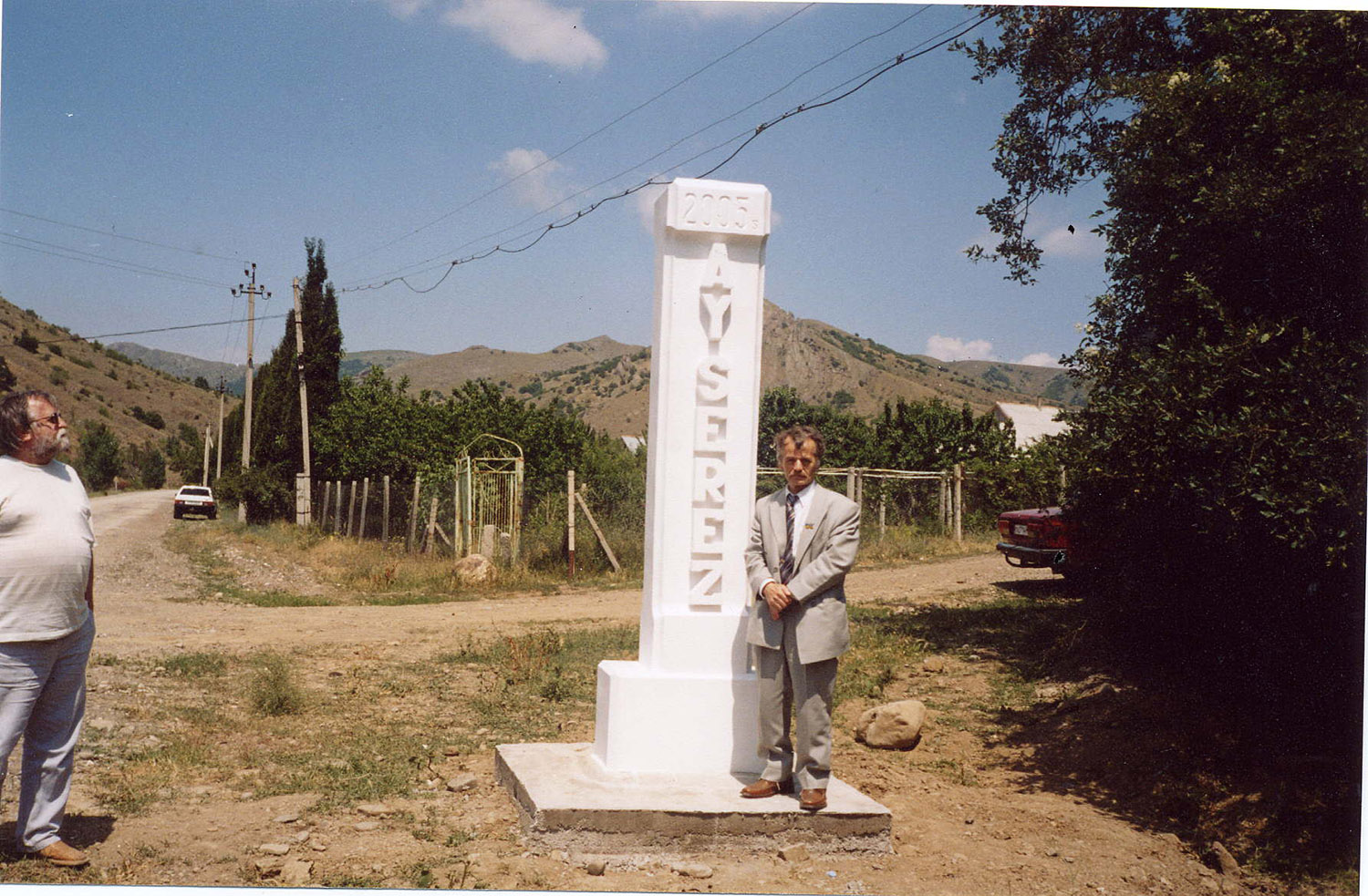
Mustafa Dżemilew koło wjazdu do wsi Aj-Serez, 2005 rok.
Areszt nr 7 i Regan
W 1986 r. przeciwko Mustafie Dżemilewowi rozpoczęto jeszcze jedno kryminalne postępowanie, już ostatnie za czasów Związku Radzieckiego.
Dżemilewa skazano warunkowo na 3 lata i wypuszczono bezpośrednio z sali sądu. Pozostał na wolności ze względu na naciski Regana na Gorbaczowa: USA stanęły w obronie kremlowskich więźniów politycznych. Wielki i potężny Związek Radziecki już trzeszczał w szwach. Była też w tym zasługa Dżemilewa, mierzona 15 latami w więzieniach i na zesłaniu.
— Taszkient, Xovos, Moskwa – „Lefortowo”, Omsk, Nowosybirsk, Irkuck, Władywostok, obóz „Prymorskyj”, obóz Omska, Petropawłowsk, — Mustafa-aga wylicza miejsca, gdzie odbywał karę.
Z właściwym sobie humorem dodaje: „cały kraj pokazali. Ale z okien więziennych samochodów”.
Areszt nr 8. Rosyjski
Dziś Dżemilew jest ponownie sądzony. Zaocznie, z trzech paragrafów kodeksu kryminalnego Rosji. Rosyjscy okupanci na jego ojczystym Krymie urządzili przedstawienie: otwierają posiedzenia, przesłuchują świadków, tworząc iluzję procesu sądowego. Dom Dżemilewa jest dla niego zamknięty od 2014 roku.
— Radziecka władza bała się światowej wspólnoty. Przeznaczała miliardy na propagandę. Nie chciała, żeby negatywne informacje trafiały za granice Związku. A Putin pluje na wszystko. Upadł na samo dno. Byle tylko zastraszyć innych i utrzymać władzę.
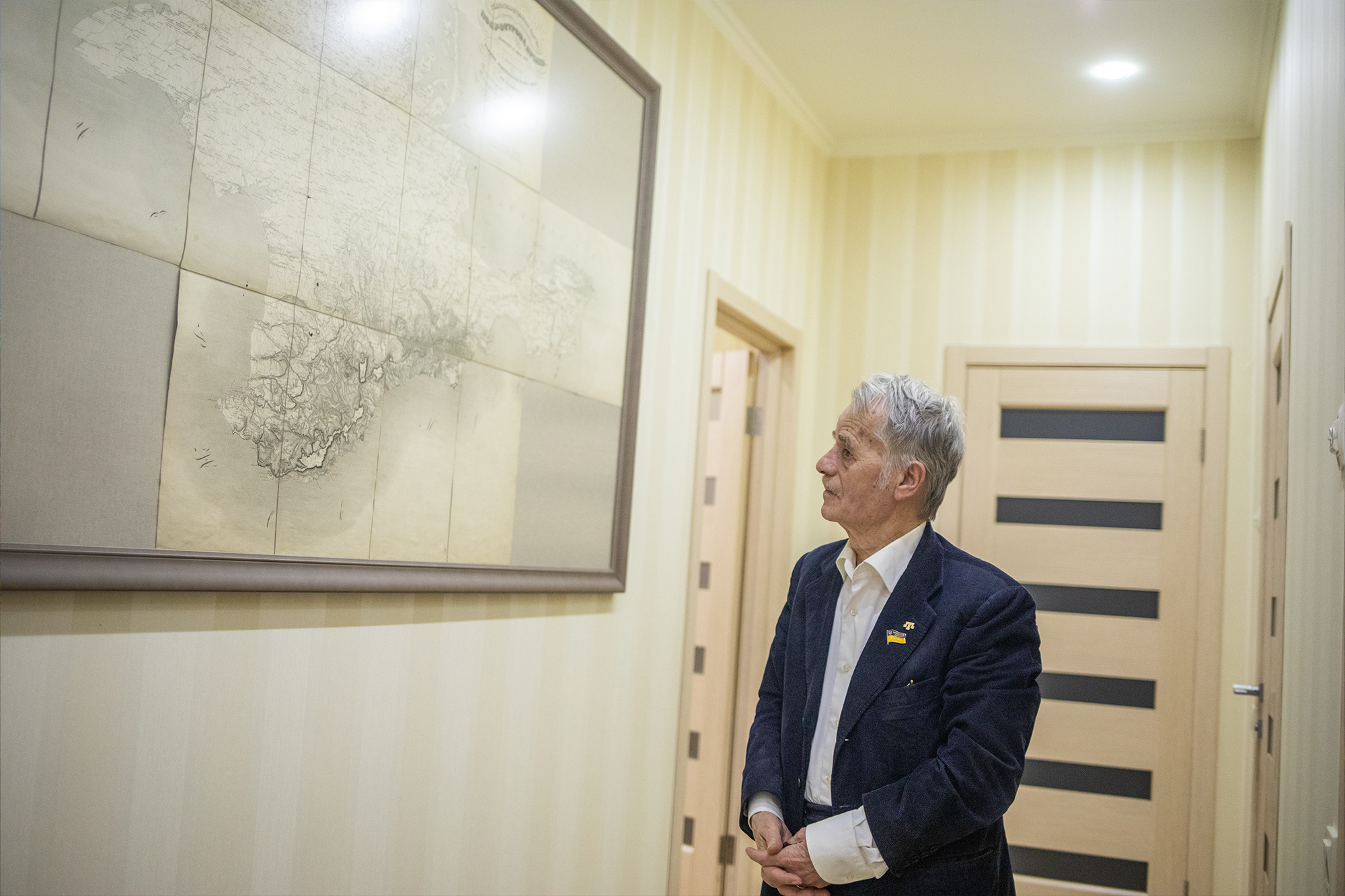
Foto: Oleksandr Chomenko dla „Lokalna istorija”
Dzisiaj częściej wymuszają zeznania biciem. Bez żadnych późniejszych konsekwencji otaczają dom, wdzierają się, wszystkich rzucają na podłogę, biją. Bo coś usłyszeli w meczecie. W rosyjskich więzieniach jest teraz 77 Tatarów krymskich, większości z nich przypisują terroryzm — podsumowuje Dżemilew.
W korytarzu jego kijowskiego biura-mieszkania wisi wielka mapa Krymu. Z dawnymi, krymskotatarskimi nazwami miejscowości, które obowiązywały do rewolucji październikowej 1917 roku. Mapa nie jest tu po to, żeby przypominać, czyj jest Krym. Ona jest gwarancją tego, że Mustafa Dżemilew na pewno wróci na półwysep. Tak, jak zrobił to w 1989 roku. Bo Krym to jego Ojczyzna, jego dom.

